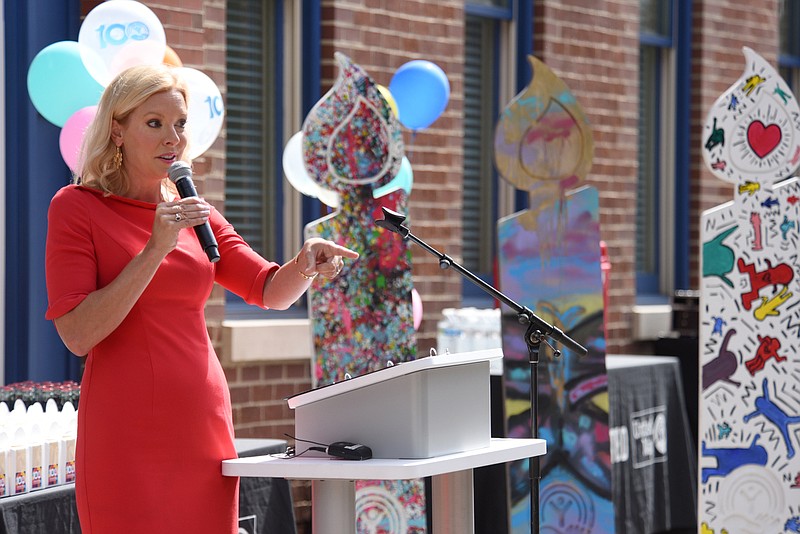The United Way of Greater Chattanooga, as chronicled in this newspaper recently, began locally 100 years ago as the Chattanooga Community Chest.
The actual date for completion of the plans for a drive that would fund 20 organizations "doing the bulk of social service work in Chattanooga" was Nov. 10, 1922, and the details were reported in the Nov. 11 Chattanooga Daily Times.
The basic campaign was to be three days, Nov. 21-23, with the desired collection to be $175,000 -- $200,000 at the maximum.
Ahead of its time for many organizations, the Community Chest was to offer "women of the city ... an opportunity to have an equal share [in the drive] with the men," according to General Chairman W.E. Brock, and was to have "no creed, color, party or social lines or distinctions. It is for the good of all the city."
The campaign, he said, would "consist of the most representative citizens who have ever taken part in public welfare work in Chattanooga."
Brock then used a phrase that has been repeated in the Chattanooga philanthropic culture and in public-private collaborations ever since.
"[T]he best way [citizens] can show their appreciation," he said, "is to get in behind the council and help put this over in the usual Chattanooga way. I know they will."
That the organization has had staying power and has been willing to grow and evolve with the times is a testament to those who have led the agency and to the demonstrable good it has done throughout the community.
Of the original 20 recipients, many are still going strong today, thanks at least in part to their national standing and to the local United Way's contributions on their behalf.
Among the first recipients were the American Legion, American Red Cross, Anti-Tuberculosis Association (whose work goes on in the American Lung Association), Boy Scouts, Little Miss Mag Day Nursery, Pro Re Bona Day Nursery, Salvation Army and Young Men's Christian Association (YMCA).
Among those eight, the two nurseries were local start-ups and still exist with slightly different names today.
But the Nov. 11, 1922, newspaper revealed that the now-United Way was not the only thing with staying power a century later.
On the day of publication of the Community Chest plans, the newspaper also had news of the cornerstone of Soldiers and Sailors Memorial Auditorium being laid. A parade and program at the Tivoli Theatre were slated to mark the occasion.
The newspaper also announced formation of the Chattanooga and Hamilton County Democratic Club. Formed at the Hotel Patten with 38 charter members, its stated purposes were to organize the men and women of the county in an effort to increase their interest in the issues [of] today and to study the constitution of the United States and Tennessee. Today, the area has both the Hamilton County Democratic Party and the JFK Club of Chattanooga.
Also exciting Chattanoogans on Nov. 11, 1922, was the opening of the Piggly-Wiggly, only the third "variety" store in the chain begun six years earlier by a Memphis-based syndicate. The store was deemed to have the largest sales room in the Market Street district.
On the occasion of the opening, orchestra music greeted guests, women were given free carnations and the throng wanting to get inside was so large police would allow only a few customers in the door at a time.
Elsewhere, in a church vs. state issue that still bubbles up from time to time today, City School Superintendent J.S. Ziegler was back from the state Board of Education committee in Nashville, where it was decided that no credit would be allowed for Bible classes in county high schools. Board of education members, in accepting a minority report, felt "that the school hardly would be justified in allowing credit for any study except those with which the authorities had some connection."
And, in news that would never be published today because of their frequency, a fight ensued between a recalcitrant high school student and a teacher ("professor," they were called). It seems the 16-year-old Chattanooga High School student "refused to obey an order" to study and continued playing with his watch. The account said the teacher resorted to "physical persuasion" and shoved the student out the door. The student, it said, engaged the instructor in "fistic difficulty" before other students broke them up. Called by the newspaper, the boy's father said he knew little about the affair, but if he found "his son at fault ... he intends seeing he is properly chastised."
School fights (alas) are still around, but the last Piggly-Wiggly left Chattanooga proper in 1992. Meanwhile, Memorial Auditorium and the United Way of Greater Chattanooga stand as sentinels from one day in history 100 years ago this fall.
